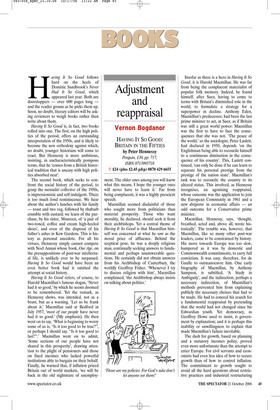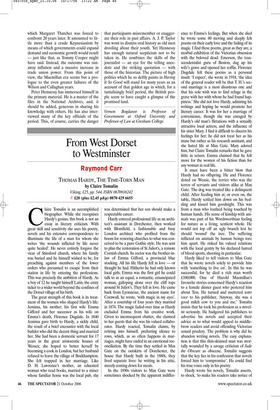Adjustment and reappraisal
Vernon Bogdanor
HAVING IT SO GOOD: BRITAIN IN THE FIFTIES by Peter Hennessy Penguin, £30, pp. 717, ISBN 0713995718 ✆ £24 (plus £2.45 p&p) 0870 429 6655 Having It So Good follows hard on the heels of Dominic Sandbrook’s Never Had It So Good, which appeared last year. Both are doorstoppers — over 600 pages long and the reader groans as he picks them up. Soon, no doubt, literary editors will be asking reviewers to weigh books rather than write about them.
Having It So Good is, in fact, two books rolled into one. The first, on the high politics of the period, offers an outstanding interpretation of the 1950s, and is likely to become the new orthodoxy against which, no doubt, younger historians will come to react. But Hennessy is more ambitious, insisting, in uncharacteristically pompous terms, that he ‘comes from a British historical tradition that is uneasy with high politics absorbed neat’.
The second book, which seeks to confront the social history of the period, to grasp the mentalité collective of the 1950s, is impressionistic and self-indulgent. There is too much fond reminiscence. We hear about the author’s lunches with his family — roast and two veg, followed by rhubarb crumble with custard; we learn of the purchase, by his sister, Maureen, of ‘a pair of two-toned, coffee and cream high-heeled shoes’, and even of the disposal of his father’s ashes in Kew Gardens. This is history as personal anecdote. For all his virtues, Hennessy simply cannot compete with Noel Annan whose book, Our Age, on the presuppositions of post-war intellectual life, is unlikely ever to be surpassed. Having It So Good would have been an even better book had it omitted the attempt at social history.
Having It So Good refers, of course, to Harold Macmillan’s famous slogan, ‘Never had it so good,’ by which he seems doomed to be remembered. Yet the remark, as Hennessy shows, was intended, not as a boast, but as a warning. ‘Let us be frank about it,’ Macmillan said at Bedford in July 1957, ‘most of our people have never had it so good.’ (My emphasis). He then went on to say, ‘What is beginning to worry some of us is, “Is it too good to be true?”, or perhaps I should say, “Is it too good to last?”.’ Macmillan went on to admit, ‘Some sections of our people have not shared in this prosperity’, drawing attention to the plight of pensioners and those on fixed incomes who lacked powerful institutions able to bargain on their behalf. Finally, he warned that, if inflation priced Britain out of world markets, ‘we will be back in the old nightmare of unemploy ment. The older ones among you will know what this means. I hope the younger ones will never have to learn it.’ Far from being complacent, it was a highly prescient speech.
Macmillan seemed disdainful of those who sought more from politicians than material prosperity. Those who want morality, he declared, should seek it from their archbishops. Yet a central theme of Having It So Good is that Macmillan himself was concerned at what he saw as the moral price of affluence. Behind the sceptical pose, he was a deeply religious man, continually seeking answers to fundamental and perhaps unanswerable questions. He certainly did not obtain answers from his Archbishop of Canterbury, the worldly Geoffrey Fisher. ‘Whenever I try to discuss religion with him’, Macmillan complained, ‘the Archbishop always insists on talking about politics.’ Insofar as there is a hero in Having It So Good, it is Harold Macmillan. He was far from being the complacent materialist of popular folk memory. Indeed, he found himself, after Suez, having to come to terms with Britain’s diminished role in the world, to formulate a strategy for a superpower in decline. Anthony Eden, Macmillan’s predecessor, had been the last prime minister to act, at Suez, as if Britain was still a great world power: Macmillan was the first to have to face the consequences that she was not. ‘The peace of the world,’ so the sociologist, Peter Laslett, had declared in 1950, depends ‘on the Englishman being able to reconcile himself to a continuous diminution in the consequence of his country’. This, Laslett continued, ‘can only be done if he can learn to separate his personal prestige from the prestige of the nation state’. Macmillan’s task was to reconcile the country to its altered status. This involved, as Hennessy recognises, an agonising reappraisal, whose outcome was the application to join the European Community in 1961 and a new dirigisme in economic affairs — an odd outcome for a Conservative prime minister.
Macmillan, Hennessy, says, ‘thought, breathed, acted and, above all, wrote historically’. The trouble was, however, that Macmillan, like so many other post-war leaders, came to be constrained by history. His move towards Europe was too slow, hampered as it was by domestic and Commonwealth commitments, to carry full conviction. It was easy, therefore, for de Gaulle to outmanoeuvre him. One early biography of Macmillan, by Anthony Sampson, is subtitled, ‘A Study in Ambiguity’, and the indirection, perhaps a necessary indirection, of Macmillan’s methods prevented him from explaining publicly the necessary choices that had to be made. He had to conceal his search for a fundamental reappraisal by pretending that the world had not changed since his Edwardian youth. Yet democracy, as Geoffrey Howe used to insist, is government by explanation; and it is perhaps this inability or unwillingness to explain that made Macmillan’s failure inevitable.
The dash for growth, based on planning and a statutory incomes policy, proved even more unfortunate than the attempt to enter Europe. For civil servants and economists had even less idea of how to secure growth than of how to control inflation. The commitment to growth sought to avoid all the hard questions about restrictive practices and industrial restructuring which Margaret Thatcher was forced to confront 20 years later. It amounted to little more than a crude Keynesianism by means of which governments could expand demand and economic growth would result — just like that, as Tommy Cooper might have said. Instead, the outcome was runaway inflation and a massive increase in trade union power. From this point of view, the Macmillan era seems but a prologue to the even greater failures of the Wilson and Callaghan years.
Peter Hennessy has immersed himself in the primary material. He is a master of the files in the National Archives, and, it should be added, generous in sharing his knowledge with others. He has also interviewed many of the key officials of the period. This, of course, carries the danger that participants misremember or exaggerate their role in past affairs. A. J. P. Taylor was wont to dismiss oral history as old men drooling about their youth. Yet Hennessy has enough natural scepticism not to be taken in. He combines the skills of the journalist — an eye for the telling anecdote and the striking quotation — with those of the historian. The picture of high politics which he so deftly paints in Having It So Good will stand for many years as an account of that golden age in which, for a tantalisingly brief period, the British people seem to have caught a glimpse of the promised land.



































































































 Previous page
Previous page